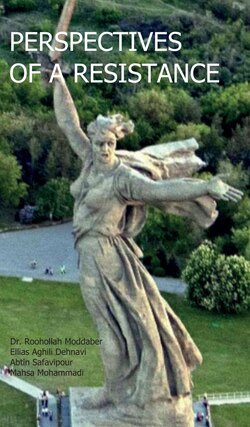Читать книгу Perspectives Of A Resistance - Ellias Aghili Dehnavi - Страница 9
На сайте Литреса книга снята с продажи.
ОглавлениеRussian resistance, the result of Allied victory:
But the thing which is important is that the current Russia is the result of the efforts of brave, patient, hardworking and resilient generations who spared no effort to achieve their goals. Meanwhile, the resilience of Russian men and women against the Nazi German fascist army's invasion of Stalingrad, which marked a lasting battle, is admirable and a source of pride for the nation and its youth.
The Battle of Stalingrad (July 17, 1942 to February 2, 1943) was the successful defense of the former Soviet army and people against German forces that had besieged the city of Stalingrad (now renamed Volgograd) and occupied many parts of it. The Russians consider this battle to be their greatest battle of the "Great Patriotic War," and many historians consider it the largest and most significant battle of World War II.
The battle actually halted the advance of German forces on the territory of the former Soviet Union, it was in fact a turning point and the tide has turned on the battlefield in favor of the Allied forces. The battle is one of the bloodiest in history, killing more than 2 million people, both military and civilian.
This historic battle was seen as a turning point in World War II and on the Eastern European Front and one of the most decisive military encounters of this devastating war. German forces consider the occupation of Volgograd as a necessary factor in order to continue their advance into south of the former Soviet Union, as they could easily have taken control of the Caucasus by occupying the city along the Volga River.
On September 3, 1942, the forces of the Sixth German Army, led by General Paulous, reached the outskirts of the city (current Volgograd) and thought they would soon occupy the city. But this was a strategic mistake because the Germans were unaware of Russia's resilient spirit.
An experienced Russian general, General V.I. Chuikov, led defense forces of the city, and General Zhukov, the most famous general in the former Soviet army, had troubled German forces with his flashing strikes.
With the fierce resistance of the Russian people, the German army was finally forced to retreat and leave the city with irreparable damage.
The victory of the Soviet Union in this battle dealt a severe blow to the German and Hitler's military forces and changed the fate of World War II.
In this book, due to the importance of this event, in the form of poetry, we have written this resistance with the symbolic depiction of (Sara), a resilient Russian woman, in the only remaining house in the city, so that that historical event can be placed in the audience's mind from another point of view.
We have also done our best to provide important historical and political analysis in forms of different articles and chapters which certainly will suit our international audience!
We will now move towards our poetic section which depicts the heroism of the Stalingrad's generals; a vast drawing using words and the magic of the rhymes and meters!
